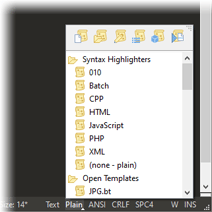

- #010 editor lz77 script how to
- #010 editor lz77 script full
- #010 editor lz77 script software
- #010 editor lz77 script code
- #010 editor lz77 script series
I verified the compressed and uncompressed length here. Moving down 0xACF4 (44276) bytes, we see another header!Įxact same thing. 0xACF4 for compressed length - 44276 bytes. The Huffman trees for each blockare independentof those for previousor subsequentblocks the LZ77algorithm may use a reference to a duplicated string occurring in a previous block, up to 32K input bytes before. 0x00010000 for the uncompressed length - yep, it's 64k after decompression. Each block is compressed using a combination of the LZ77 algorithm and Huffman coding.
#010 editor lz77 script code
My current guess is that you'll need to write a little more code to pull out the exact block that ZLIB needs to decrypt - if I'm reading the code right, this is done within the LZ77 library, so it'll need to be rewritten for use with ZLIB.Įdit : Just to illustrate, here's some stuff from that DA:I cas_01.cas file. ZLIB has apparently been part of Python's libraries for a long time, so the code should be able to be converted. Decompression works (so long as you use DotNetZip and not the internal System.IO.Compression.DeflateStream class). I wrote a few crap tools to try to pull this stuff out of the CAS files in. We have 02 70 in our headers, and in these cases, the data is very clearly compressed with ZLIB. That 09 70 header that is in front of LZ77-compressed data? DA:I doesn't have that. However, I can point out something that you guys can add : toc file from the game folder but that just seems counter productive.I haven't ever worked with Python before, so I can't fix the script.

toc does allow me to continue but anytime I remove the mentioned file, it just keeps giving me a new error. With Dragon Age Inquisition recently coming out, should the tool be able to extract audio from the game? I've been fiddling around with the dumper.py script for a bit but I keep getting errors. #if compressed=uncompressed, one might be tempted to think that it is always non-zlib. Try: outStream.write(compress(f.read(compressedSize)))Įxcept: outStream.write(f.read(compressedSize))

#010 editor lz77 script full
#abandon the whole loop and just give back the full payload without decompression #The sizes may be just random non-zlib payload as soon as that happens, If compressedSizeii",f.read(8)) #big endian If compressedSize>size-8: return f.read(size) #sanity check: compressedSize may be just random non-zlib payload. Replace the zlibb function in dumper.py use the one below: Now, I've toyed with the function a bit more and it *should* work better than before. The script apparently made a wrong choice somewhere. I've used a heuristic approach to determine whether a file has this Frostbite specific zlib format or if it is just uncompressed data. ' PCB Service : Run pcb-service.Thanks again for the quick and comprensive replies!Īh, zlib once again. MENU ' Search and order : Run designlink-order.ulp -general '\ # Uncomment this if you want a set of useful default shortcuts! # This file can be used to configure the editor windows. Check it out below: # Configuration Script Whether you are designing schematics, designing boards, designing both or just reviewing designs, you can tailor the configuration of Eagle to allow you to work more efficiently.Įagle is distributed with a default configuration script it sets some default layers to be used, sets the unit(s) of measure, sets the grid spacing and calls some. Perhaps the most valuable feature of a personalized configuration script is the ability to setup a hotkey assignment map and workspace that caters to how you use Eagle. By changing the set of commands within the configuration script, the user can customize the settings of any of the aforementioned Eagle editors without the tedium of having to manually change the settings every time you open up an instance of Eagle. These include: BOARD Editor, SCHEMATIC Editor, LIBRARY Editor, DEVICE Editor, PACKAGE Editor and SYMBOL Editor.
#010 editor lz77 script series
The configuration script contains a series of commands written in human readable text that change the settings for any instance of an Eagle editor workspace when opened. When an instance of an Eagle editor is opened, Eagle accesses a configuration script file ( eagle.scr).

Put simply, it's a file used to configure an instance of Eagle with specific settings when opened. If you are new to Eagle or unfamiliar entirely, check out these tutorials to help you get started: That said, this is just a quick explainer, and there will be plenty left unsaid about using Eagle scripts.
#010 editor lz77 script software
Let me preface this by saying that there is more I do not know about Autodesk's EAGLE PCB Design Software than there is that I do.
#010 editor lz77 script how to
Let's talk about Eagle Configuration Scripts: how to use them, and why using your own can make your Eagle experience more enjoyable and efficient.


 0 kommentar(er)
0 kommentar(er)
